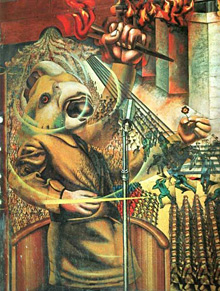 |
 |
 |
 Editorials | July 2006 Editorials | July 2006  
Mexico's Tiger Stirs
 The Nation The Nation


| | "Juicio al fascismo" by David Alfaro Siqueiros 1939 (detail) |
Porfirio Díaz, Mexico's dictator from 1876 to 1910, always feared a popular revolution. "We must not awaken the tiger," Díaz famously declared. The revolution that erupted in 1910 cost more than a million lives. Mexican intellectuals have recently warned that the tiger is stirring once again in the wake of the country's contested July 2 presidential election, the initial results of which granted a razor-thin victory to Felipe Calderón of the conservative National Action Party (PAN).

Calderón's so-called victory is shrouded in suspicion. On July 3 the Federal Electoral Institute (IFE) informed the world that with nearly all the votes counted in its preliminary result, Calderón was slightly ahead of Andrés Manuel López Obrador of the center-left Party of the Democratic Revolution (PRD). AMLO, as López Obrador is known, immediately insisted that the autonomous IFE (much praised by US media for its supposed professionalism in administering the election) had neglected to count 3 million votes. The institute acknowledged the error and ordered that those ballots be tallied. Two days later IFE announced that Calderón had won by 240,000 votes. Mexico is now enduring its own version of the Florida election debacle of 2000, and it amounts to a constitutional and political crisis.

Was the process fair? AMLO insists that "irregularities" took place at 50,000 polling stations (of 130,000). The newspaper La Jornada featured on its cover a crumpled ballot rescued from a garbage bin in a working-class AMLO stronghold in Mexico City. On July 9 the PRD officially requested a complete recount at disputed polling stations, and it has launched a two-pronged strategy to achieve it. On the legal front PRD lawyers have delivered hundreds of pages of documentation concerning electoral chicanery to a special electoral tribunal; that tribunal, which has demonstrated independence in the past, has the power to order a partial or full recount, and it must certify the winner by September 6. On the political front the left has unleashed its forces on the streets. On July 8 several hundred thousand AMLO supporters converged on Mexico City's central square for a raucous demonstration, and the PRD called another rally for July 16. Some US newspapers have implied that AMLO is a demagogue for sanctioning such tactics, but these critics fail to understand that he is under crushing pressure from his own rank and file. "If Andrés Manuel does not assume leadership," one PRD leader told the Financial Times, "there will be chaos. The people are very angry."

For the Mexican left, the echoes from the past are positively eerie. In 1988 Cuauhtémoc Cárdenas was ahead in the presidential voting when the computer system tracking the votes suddenly crashed on election night; when it was back up, the result was a slim victory for his opponent. That memory is fresh in the minds of many PRD voters, and the next six weeks will be a period of brutal political warfare as Calderón and his supporters endeavor to consolidate their disputed victory, which has already been acknowledged by world leaders, including George W. Bush. The PRD-PAN struggle will be a contest over symbols, imagery and information: Mexico has robust independent newspapers and magazines, but their circulation and influence are narrow compared with TV Azteca and Televisa, privately owned TV conglomerates that have been resolutely hostile to AMLO and the PRD in the past.

Some commentators suggest that AMLO should simply give up the fight. Many pundits gave the same advice to Al Gore in 2000 when he sought to claim his victory in Florida. But Mexico is a more polarized and combustible society than the United States. A recount of the disputed ballots is the surest way to strengthen Mexico's fledgling democratic institutions, and to forestall a potential political and social conflagration. | 
 | |
 |



